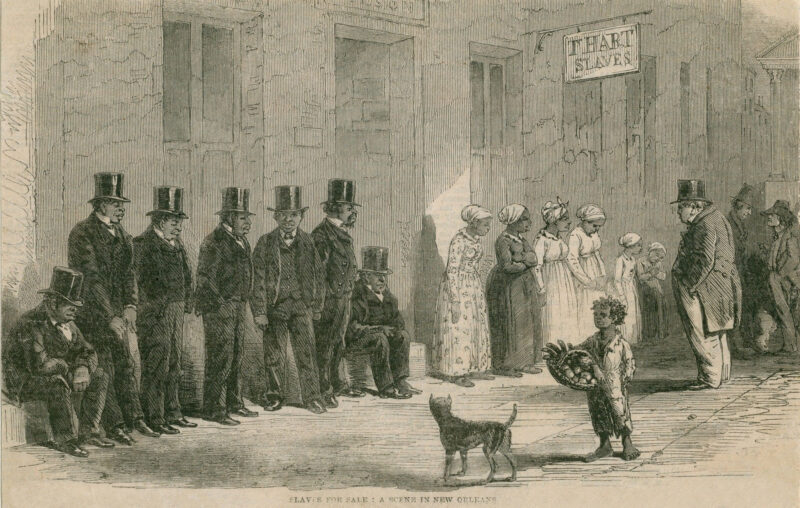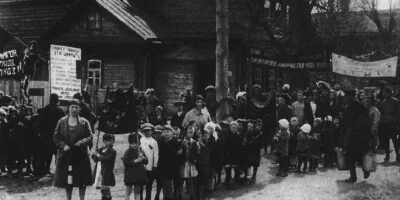An Academic Footnote for Florida’s Slavery Curriculum

The state of Florida has found itself embroiled in a controversy over a new set of classroom standards on slavery. As with most K-12 curricula, the new standards are heavy on formulaic “lessons” to check boxes about names, dates, and subjects being covered. This approach often lacks the nuance and complexity that are needed to examine historical subjects such as slavery, but it is also endemic to our public education system in red and blue states alike.
The Florida curriculum came under fire for one such bullet point. Section SS.68.AA.2.3 stipulates that, in a unit on American slavery, “Instruction includes how slaves developed skills which, in some instances, could be applied for their personal benefit.”
The passage set off a firestorm of controversy, with Vice President Kamala Harris denouncing the provision as an attempt to place a positive spin on slavery. The charge entailed a deeply uncharitable reading of the curriculum’s text, which is more a product of linguistic bureaucratese than revisionist history. At the same time, Florida’s defenders did themselves few favors by stumbling in their response and further removing the controversial passage from its context.
While I have no particular insight into the design of this curriculum, the line appears to be an awkwardly-worded reference to a real historical practice. Before the American Civil War, some enslaved African-Americans cultivated skilled trades as a means of earning small amounts of money and increasing their status in the household. In time, some slaves with specific skills were able to obtain freedom for themselves or their families through the practice of self-purchase, or through negotiated manumission from the persons who enslaved them. Others used their skills as leverage for better working assignments and living conditions than could be found among field hands.
In noting the existence of these curious arrangements, we must not lose sight of the abject brutality of slavery. Nor do they ameliorate the many wrongs and hypocrisies of the south’s “peculiar institution.” The acquisition and use of skilled trades by enslaved persons for various forms of leverage is nonetheless the subject of a well-developed academic literature going back several decades. Self-purchase arrangements, and similar mechanisms attained through negotiated manumission, gave rise to sizable free black populations in southern cities such as Baltimore and New Orleans. They also sparked a backlash from slave-owners before the Civil War, resulting in increasingly restrictive legal obstacles to manumission and black property ownership in many states.
I call attention to this academic literature because it illustrates the raw politicization of the Florida curriculum debate. Its clumsy wording aside, the now-controversial Florida classroom bullet point is not, in fact, very far from what the academic history profession has written about the same subject for decades. As an illustrative example, we may turn to Edward Baptist’s book The Half Has Never Been Told, which makes an almost-identical claim about enslaved African-Americans being able to improve their leverage and even earn money to buy their own freedom through the acquisition of skills:
In the Chesapeake and Carolinas, enslaved men rose in status by learning trades. They might be blacksmiths or coopers, teamsters or house servants. Women could become servants, cooks, or weavers. Such skills could gain one respite from incessant field labor, or even give hired-out slaves the possibility of keeping some of the earnings. Artisans were even important in Louisiana. Sugar making, for instance, required a class of trained enslaved experts who supervised the boiling process. They sold for high prices. Whites identified 5 percent of local slaves sold in New Orleans from 1800 to 1820 with a specific skill.
Baptist uses this example as a point of contrast to other brutalities arising from the domestic slave trade. Specifically, many slaves with skills found themselves reduced to field laborers on plantations when they were sold from the eastern states to the deep south. Baptist argues that “[s]kills meant that one could claim some authority over a task and tools,” and points to the loss of this leverage under the brutal forced relocations of the internal slave trade. Slaves who were sold south and west, in his telling, became “hands” without regard for their skills. “[T]hey came out with those skills erased.” Grueling agricultural work on the cotton plantations thus stood in contrast with the craftsmen’s skills that emerged in the east and in the cities.
Baptist and other academic historians once readily admitted this distinction in their published works. Only when politics entered the equation did they begin denouncing the very same arguments that they previously made, and previously treated as uncontroversial.
The nearly identical claims about skilled labor in the Florida curriculum and in Ed Baptist’s discussion of the eastern states come with an added layer of irony. Baptist is the leading figure of the “New History of Capitalism” school, a far-left branch of academic history that aims to link slavery with allegedly “capitalistic” economic development in the United States as a means of discrediting the latter. Baptist advised Nikole Hannah-Jones on the New York Times’s 1619 Project, and his book provided the basis for Matthew Desmond’s error-riddled essay on slavery and capitalism in the same series.
Florida’s education department may have an easy solution to its present conundrum. To address the controversy and do so with the blessings of a leading figure from 1619 Project historiography, they only need to add a footnote to page 103 of Ed Baptist’s The Half Has Never Been Told.











